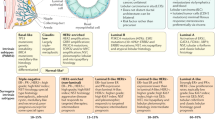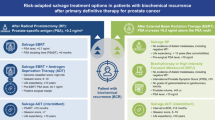Abstract
Background:
Active surveillance (AS) is increasingly utilized in low-risk prostate cancer (PC) patients. Although black race has traditionally been associated with adverse PC characteristics, its prognostic value for patients managed with AS is unclear.
Methods:
A retrospective review identified 145 patients managed with AS at the Duke Prostate Center from January 2005 to September 2011. Race was patient-reported and categorized as black, white or other. Inclusion criteria included PSA <10 ng ml−1, Gleason sum ⩽6, and ⩽33% of cores with cancer on diagnostic biopsy. The primary outcome was discontinuation of AS for treatment due to PC progression. In men who proceeded to treatment after AS, the trigger for treatment, follow-up PSA and biopsy characteristics were analyzed. Time to treatment was analyzed with univariable and multivariable Cox proportional hazards models and also stratified by race.
Results:
In our AS cohort, 105 (72%) were white, 32 (22%) black and 8 (6%) another race. Median follow-up was 23.0 months, during which 23% percent of men proceeded to treatment. The demographic, clinical and follow-up characteristics did not differ by race. There was a trend toward more uninsured black men (15.6% black, 3.8% white, 0% other, P=0.06). Black race was associated with treatment (hazard ratio (HR) 2.93, P=0.01) as compared with white. When the analysis was adjusted for socioeconomic and clinical parameters at the time of PC diagnosis, black race remained the sole predictor of treatment (HR 3.08, P=0.01). Among men undergoing treatment, the trigger was less often patient driven in black men (8 black, 33 white, 67% other, P=0.05).
Conclusions:
Black race was associated with discontinuation of AS for treatment. This relationship persisted when adjusted for socioeconomic and clinical parameters.
This is a preview of subscription content, access via your institution
Access options
Subscribe to this journal
Receive 4 print issues and online access
$259.00 per year
only $64.75 per issue
Buy this article
- Purchase on Springer Link
- Instant access to full article PDF
Prices may be subject to local taxes which are calculated during checkout


Similar content being viewed by others
References
Dall’Era MA, Konety BR, Cowan JE, Shinohara K, Stauf F, Cooperberg MR et al. Active surveillance for the management of prostate cancer in a contemporary cohort. Cancer 2008; 112: 2664–2670.
Klotz L, Zhang L, Lam A, Nam R, Mamedov A, Loblaw A . Clinical results of long-term follow-up of a large, active surveillance cohort with localized prostate cancer. J Clin Oncol 2010; 28: 126–131.
Tosoian JJ, Trock BJ, Landis P, Feng Z, Epstein JI, Partin AW et al. Active surveillance program for prostate cancer: an update of the Johns Hopkins experience. J Clin Oncol 2011; 29: 2185–2190.
Eggener SE, Mueller A, Berglund RK, Ayyathurai R, Soloway C, Soloway MS et al. A multi-institutional evaluation of active surveillance for low risk prostate cancer. J Urol 2009; 181: 1635–1641.
Johansson J-E, Andrén O, Andersson S-O, Dickman PW, Holmberg L, Magnuson A et al. Natural history of early, localized prostate cancer. JAMA 2004; 291: 2713–2719.
Jemal A, Siegel R, Xu J, Ward E . Cancer statistics, 2010. CA Cancer J Clin 2010; 60: 277–300.
Freedland SJ, Isaacs WB . Explaining racial differences in prostate cancer in the United States: sociology or biology? Prostate 2005; 62: 243–252.
Barocas DA, Penson DF . Racial variation in the pattern and quality of care for prostate cancer in the USA: mind the gap. BJU Int 2010; 106: 322–328.
Nielsen ME, Han M, Mangold L, Humphreys E, Walsh PC, Partin AW et al. Black race does not independently predict adverse outcome following radical retropubic prostatectomy at a tertiary referral center. J Urol 2006; 176: 515–519.
Jani AB, Gratzle J . Analysis of impact of age and race on biochemical control after radiotherapy in different prostate cancer settings. Urology 2005; 66: 124–129.
Rosser CJ, Kuban DA, Lee SJ, Levy LB, Pettaway C, Kamat AM et al. Racial influence on biochemical disease-free survival in men treated with external-beam radiotherapy for localized prostate cancer. J Natl Med Assoc 2004; 96: 939–944.
Barrett WL, Kassing WM, Shirazi R . Efficacy of brachytherapy for prostate cancer in African Americans compared with Caucasians. Brachytherapy 2004; 3: 30–33.
Resnick MJ, Canter DJ, Guzzo TJ, Brucker BM, Bergey M, Sonnad SS et al. Does race affect postoperative outcomes in patients with low-risk prostate cancer who undergo radical prostatectomy? Urology 2009; 73: 620–623.
Sridhar G, Masho SW, Adera T, Ramakrishnan V, Roberts JD . Do African American men have lower survival from prostate cancer compared with white men? A meta-analysis. Am J Mens Health 2010; 4: 189–206.
Hamilton RJ, Aronson WJ, Presti JC, Terris MK, Kane CJ, Amling CL et al. Race, biochemical disease recurrence, and prostate–specific antigen doubling time after radical prostatectomy. Cancer 2007; 110: 2202–2209.
Latini DM, Elkin EP, Cooperberg MR, Sadetsky N, DuChane J, Carroll PR et al. Differences in clinical characteristics and disease-free survival for Latino, African American, and non-Latino white men with localized prostate cancer. Cancer 2006; 106: 789–795.
Winkfield KM, Chen M-H, Dosoretz DE, Salenius SA, Katin M, Ross R et al. Race and survival following brachytherapy-based treatment for men with localized or locally advanced adenocarcinoma of the prostate. Int J Rad Oncol Biol Phy 2011; 81: e345–e350.
Yamoah K, Stone N, Stock R . Impact of race on biochemical disease recurrence after prostate brachytherapy. Cancer 2011; 117: 5589–5600.
Tarman GJ, Kane CJ, Moul JW, Thrasher JB, Foley JP, Wilhite D et al. Impact of socioeconomic status and race on clinical parameters of patients undergoing radical prostatectomy in an equal access health care system. Urology 2000; 56: 1016–1020.
Amling CL, Riffenburgh RH, Sun L, Moul JW, Lance RS, Kusuda L et al. Pathologic variables and recurrence rates as related to obesity and race in men with prostate cancer undergoing radical prostatectomy. J Clin Oncol 2004; 22: 439–445.
Johnstone PAS, Kane CJ, Sun L, Wu H, Moul JW, McLeod DG et al. Effect of race on biochemical disease-free outcome in patients with prostate cancer treated with definitive radiation therapy in an equal-access health care system: radiation oncology report of the department of defense center for prostate disease research1. Radiology 2002; 225: 420–426.
Moses KA, Paciorek AT, Penson DF, Carroll PR, Master VA . Impact of ethnicity on primary treatment choice and mortality in men with prostate cancer: data from CaPSURE. J Clin Oncol 2010; 28 (6): 1069–1074.
Schwartz K, Powell IJ, Underwood Iii W, George J, Yee C, Banerjee M . Interplay of race, socioeconomic status, and treatment on survival of patients with prostate cancer. Urology 2009; 74: 1296–1302.
Tewari AK, Gold HT, Demers RY, Johnson CC, Yadav R, Wagner EH et al. Effect of socioeconomic factors on long-term mortality in men with clinically localized prostate cancer. Urology 2009; 73: 624–630.
Chu DI, Moreira DM, Gerber L, Presti JC, Aronson WJ, Terris MK et al. Effect of race and socioeconomic status on surgical margins and biochemical outcomes in an equal-access health care setting: Results from the Shared Equal Access Regional Cancer Hospital (SEARCH) database. Cancer 2012; e-pub ahead of print, 13 March 2012.
Banez LL, Terris MK, Aronson WJ, Presti JC, Kane CJ, Amling CL et al. Race and time from diagnosis to radical prostatectomy: does equal access mean equal timely access to the operating room?Results from the SEARCH database. Cancer Epidemiol Biomarkers Prev 2009; 18: 1208–1212.
Cullen J, Brassell SA, Chen Y, Porter C, L’Esperance J, Brand T et al. Racial/ethnic patterns in prostate cancer outcomes in an active surveillance cohort. Prostate Cancer 2011; 2011: 234519.
Koscuiszka M, Hatcher D, Christos PJ, Rose AE, Greenwald HS, Chiu Y-l et al. Impact of race on survival in patients with clinically nonmetastatic prostate cancer who deferred primary treatment. Cancer 2011; 118: 3145–3152.
Iremashvili V, Soloway MS, Rosenberg DL, Manoharan M . Clinical and demographic characteristics associated with prostate cancer progression in patients on active surveillance. J Urol 2012; 187: 1594–1600.
Connolly D, Black A, Murray LJ, Napolitano G, Gavin A, Keane PF . Methods of calculating prostate-specific antigen velocity. Eur Urol 2007; 52: 1044–1051.
Shavers VL, Brown M, Klabunde CN, Potosky AL, Davis W, Moul J et al. Race/ethnicity and the intensity of medical monitoring under ‘watchful waiting’ for prostate cancer. Med Care 2004; 42: 239–250.
Moul JW, Sesterhenn IA, Connelly RR, Douglas T, Srivastava S, Mostofi FK et al. Prostate-specific antigen values at the time of prostate cancer diagnosis in African-American men. JAMA 1995; 274: 1277–1281.
Powell IJ, Bock CH, Ruterbusch JJ, Sakr W . Evidence supports a faster growth rate and/or earlier transformation to clinically significant prostate cancer in black than in white american men, and influences racial progression and mortality disparity. J Urol 2010; 183: 1792–1797.
Mohler JL, Gaston KE, Moore DT, Schell MJ, Cohen BL, Weaver C et al. Racial differences in prostate androgen levels in men with clinically localized prostate cancer. J Urol 2004; 171 (Pt 1): 2277–2280.
Kwabi-Addo B, Wang S, Chung W, Jelinek J, Patierno SR, Wang B-D et al. Identification of differentially methylated genes in normal prostate tissues from african american and caucasian men. Clin Cancer Res 2010; 16: 3539–3547.
Kim HS, Moreira DM, Jayachandran J, Gerber L, Banez LL, Vollmer RT et al. Prostate biopsies from black men express higher levels of aggressive disease biomarkers than prostate biopsies from white men. Prostate Cancer Prostatic Dis 2011; 14: 262–265.
Porten SP, Whitson JM, Cowan JE, Cooperberg MR, Shinohara K, Perez N et al. Changes in prostate cancer grade on serial biopsy in men undergoing active surveillance. J Clin Oncol 2011; 29: 2795–2800.
Acknowledgements
This work was financially supported by Duke Urology Committee for Urologic Research, Education and Development (CURED) Endowment Fund.
Author information
Authors and Affiliations
Corresponding author
Ethics declarations
Competing interests
The authors declare no conflict of interest.
Rights and permissions
About this article
Cite this article
Abern, M., Bassett, M., Tsivian, M. et al. Race is associated with discontinuation of active surveillance of low-risk prostate cancer: Results from the Duke Prostate Center. Prostate Cancer Prostatic Dis 16, 85–90 (2013). https://doi.org/10.1038/pcan.2012.38
Received:
Revised:
Accepted:
Published:
Issue Date:
DOI: https://doi.org/10.1038/pcan.2012.38
Keywords
This article is cited by
-
Progression on active surveillance for prostate cancer in Black men: a systematic review and meta-analysis
Prostate Cancer and Prostatic Diseases (2022)
-
African-American men with low-risk prostate cancer treated with radical prostatectomy in an equal-access health care system: implications for active surveillance
Prostate Cancer and Prostatic Diseases (2020)
-
An electronic registry to improve adherence to active surveillance monitoring among men with prostate cancer at a safety-net hospital: protocol for a pilot study
Pilot and Feasibility Studies (2019)
-
Is active surveillance a suitable option for African American men with prostate cancer? A systemic literature review
Prostate Cancer and Prostatic Diseases (2017)
-
African-American Prostate Cancer Disparities
Current Urology Reports (2017)



